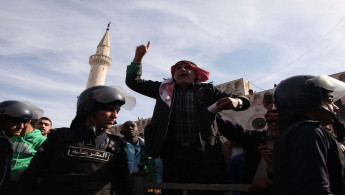Jordan human rights record shamed in report
Jordan human rights record shamed in report
National Centre for Human Rights criticises resumption of executions, says complaints of state torture are rising and the government does little to investigate violations.
3 min read
Jordan has arrested scores of people it accuses of threatening state security [Getty]
Human rights conditions in Jordan suffered a sharp decline in human rights conditions last year, according to a report by a quasi-governmental body.
The report, which was published by the National Centre for Human Rights in Arabic but not English, said there was a higher incidence of violations against the right to life and physical safety, freedom, personal security, fair trials and the freedom of opinion and expression.
The report, which was published by the National Centre for Human Rights in Arabic but not English, said there was a higher incidence of violations against the right to life and physical safety, freedom, personal security, fair trials and the freedom of opinion and expression.
The report, a copy of which was handed to Prime Minister Abdullah Ensour on Monday, said the Jordanian government's efforts to improve human rights did not go much beyond "managing violations" and implementing "non-radical protection measures".
The report criticised the government's execution of 11 people for murder in 2014 and called for the death penalty to be abolished.
The death penalty in Jordan had been frozen since March 2006, until the government decided to reinstate it last year.
"The execution of 11 came as a surprise and without prior notification of the inmates or their families as stipulated in international norms," the report said.
The report recorded 87 complaints regarding incidents of torture in state custody last year, compared to 77 in 2013, and 11 such complaints inside prisons compared to 19 in 2013.
| The report criticised the government's execution of 11 people and called for abolishing the death penalty. |
The report said: "The legal environment remains incapable of prosecuting perpetrators of torture."
The report also said the authorities had failed to commission serious and independent investigations into allegations of torture.
The centre recommended establishing an independent national mechanism to conduct regular visits to detention facilities, and called on Jordan to sign the optional supplementary protocol of the UN Convention against Torture.
The report also recommended that the Public Security Directorate take action to curb violations by its officers, and to prosecute those involved in torture.
The report documents increasing use of force and heavy-handedness during police raids and arrests.
The report stated: "Most of these raids were accompanied by the use of force, and complaints that children and women had been brutalised."
The NCHR recommends the security services stop raiding civilian homes using force except when "absolutely necessary", and only after all precautions are taken to prevent terrorising citizens, especially women and children.
The report criticised custody conditions, including in temporary jails managed by the security directorate and the intelligence services. It said that the buildings used are old and require extensive restoration to improve hygiene and protect against the heat and the cold in the summer and winter respectively.
The report said some custody centres were overcrowded and have no attached healthcare facilities. Others isolate inmates and deny them visiting privileges throughout their time in custody, sometimes holding them incommunicado.
The report concluded with general recommendations calling for improvement of human rights conditions and political and social reforms.
The report also called on the government to strengthen institutions concerned with law enforcement. The government must boost regulatory mechanisms and procedures for official and public accountability, it added, as well as deepen partnership with civil society institutions.
The centre is an independent national institution which was set up in 2006.
This is an edited translation from our Arabic edition



